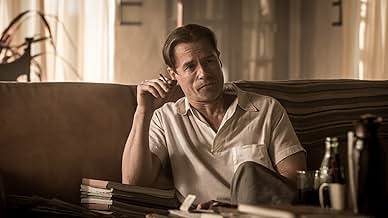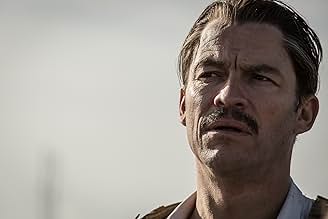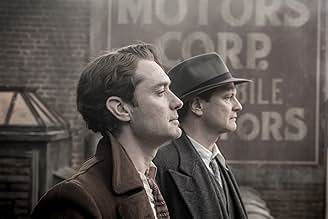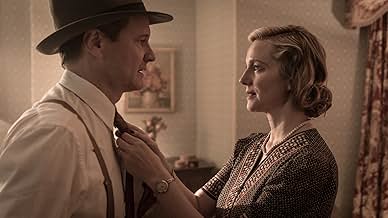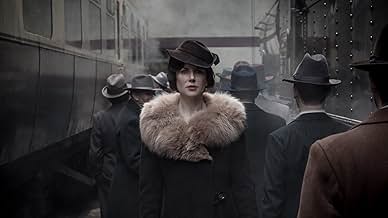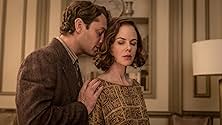IMDb-BEWERTUNG
6,5/10
22.270
IHRE BEWERTUNG
Eine Chronik über Max Perkins' Zeit als Lektor bei Scribner, wo er unter anderen Thomas Wolfe, Ernest Hemingway und F. Scott Fitzgerald betreute.Eine Chronik über Max Perkins' Zeit als Lektor bei Scribner, wo er unter anderen Thomas Wolfe, Ernest Hemingway und F. Scott Fitzgerald betreute.Eine Chronik über Max Perkins' Zeit als Lektor bei Scribner, wo er unter anderen Thomas Wolfe, Ernest Hemingway und F. Scott Fitzgerald betreute.
- Auszeichnungen
- 1 Gewinn & 6 Nominierungen insgesamt
Angela Sant'Albano
- Bertha Perkins
- (as Angela Ashton)
Ray Strasser King
- James, Mailroom Clerk
- (as Ray Strasser-King)
Empfohlene Bewertungen
I did get caught up in this story. I have admired the work of Thomas Wolfe as well as the accomplishments of F. Scott Fitzgerald and Ernest Hemingway. This film makes Wolfe about as quirky and outrageous as one can be. He reminds me a little of Sheldon Cooper on "The Big Bang Theory," totally self-absorbed and uninterested in the lives and aspirations of others. Apparently, there were numerous inaccuracies in this film as they relate to the publication of the first book, "Look Homeward, Angel," as well as biographical events involving his lover. Obviously, there is always license in these films, but how important are these criticisms? The acting of Colin Firth, Nicole Kidman, and Jude Law make this cook. A view into the lives of the most successful authors of their time and the master editor at Scribner's is beautifully done. There is fantastic cinematography. Even if every fact fails under scrutiny, it gives a portrayal of a fascinating man and his cohort. I recommend it.
I find it hard to understand how this excellent film is getting negative reviews from critics. It is like a breath of fresh air for thinking movie goers. It is a thoughtful, intelligent and highly entertaining look at Maxwell Perkins, an editor who as he said wanted to bring "good books" to the public. He did, bringing us the works of Fitzgerald, Hemingway and Thomas Wolfe who is the focus of the film. It gives a historical perspective of two opposites (Perkins and Wolfe) who working together create something substantial. Perkins is a strong main character with a noble moral center, beautifully underplayed by Firth. When did we last see someone acting nobly in a film? In contrast, to the larger than life and decadent Wolfe (I had no idea Wolfe was played by Jude Law, until after the film) Law immerses himself in the character. The fact that this is a true story makes it all the more compelling. My fifteen year old daughter who is well versed in the writings of both Fitzgerald and Hemingway encouraged me to see Genius. We both walked away exhilarated; the way you feel after seeing a really good movie that transported you somewhere else. The Director, writer, actors and composer/ scorer all did a first rate job to help bring a to bring a great film to the public.
Colin Firth and Jude Law Portray editor Max Perkins and his newest client, Tomas Wolfe. Perkins is a tight wound package of seriousness, work being his life. Wolfe is a frenetic writer, eating up everything around him with voracity. The polar opposites take on Wolfe's first novel, "Look Homeward, Angel." I admit, Law's Wolfe is energizer- bunny out-of-control frenetic at times, but it's that kind of mind that gave us one of the greatest (if not the greatest) American novels of all time. Having read "Angel," I completely bought into it. The relationship between editor and writer becomes extremely close, at times casting aside the women in their lives. Laura Linney is Louise Perkins, devoted wife to Max and their 5 daughters. She is also trying to keep her own writing career alive, with little help from her work obsessed husband. Nicole Kidman is Aline Bernstein, a married woman currently shacking up with Wolfe. She was his inspiration in writing "Angel" and is over zealously jealous of Tom's relationship with Max. Like, seriously, wack-job crazy. This role was the weak link for me, didn't like her from her second appearance on screen. The movie moves through their lives, another published book, and on to Wolfe's untimely death. (I am pretty sure that isn't a spoiler.) I don't want to go in to the plot anymore, except to say that I agree with another reviewer about the scene in the jazz club. A really great way to show how minds, and the streaming of thought, can be so different between people.
The cinematography is beautiful, sepia tones bring you back to the years right before and during the depression. Extravagance and soup kitchens, back-to-back. The music bangs out with Wolfe's bombastic behavior, and mellows with Max.
This movie is a movie about writers and readers, for what editor isn't a closet writer? It's also for the same audience, with several nods to a few other greats of that period; Hemingway and F. Scott Fitzgerald, but mostly, to Wolfe. When Max is reading "Angel" through for the first time, his daughter walks in. She looks at the page and says, "Wow, that's a really long paragraph" and Max answers "It started four pages ago..." THAT is Wolfe. That book was the most difficult book I have ever read. This movie is also about, who exactly is the genius? Wolfe is, obviously. But does that make Max, who edited, made these books marketable, and made Wolfe a celebrity of his day, any less of a genius? That is left for the viewer.
The cinematography is beautiful, sepia tones bring you back to the years right before and during the depression. Extravagance and soup kitchens, back-to-back. The music bangs out with Wolfe's bombastic behavior, and mellows with Max.
This movie is a movie about writers and readers, for what editor isn't a closet writer? It's also for the same audience, with several nods to a few other greats of that period; Hemingway and F. Scott Fitzgerald, but mostly, to Wolfe. When Max is reading "Angel" through for the first time, his daughter walks in. She looks at the page and says, "Wow, that's a really long paragraph" and Max answers "It started four pages ago..." THAT is Wolfe. That book was the most difficult book I have ever read. This movie is also about, who exactly is the genius? Wolfe is, obviously. But does that make Max, who edited, made these books marketable, and made Wolfe a celebrity of his day, any less of a genius? That is left for the viewer.
"O lost, and by the wind grieved, ghost, come back again." ― Thomas Wolfe, Look Homeward, Angel
Max Perkins (Colin Firth) was the genius Scribner's magazine editor, who helped Hemingway, Fitzgerald, and Wolfe become iconic American writers. The watchable Genius, directed by Michael Grandage with a sure understanding of drama, is mostly Thomas Wolfe's (Jude Law) story. The taciturn Max provides the necessary guidance to make sure the book belongs to the writer while Max delivers "good books into the hands of readers."
Although the film is engrossingly placed in Perkin's pv, Wolfe dominates through his exuberant personality and unending energy. While Firth plays Perkins as the conservative but imaginative editor, Law is the reason to see the film, a brilliant acting turn reminiscent of his over-the-top Dom Hemingway. Law simply has never been better than as Wolfe.
The sepia look of the film is appropriate to the 1929 setting of NYC, and Nicole Kidman as his other muse, Aline Bernstein, is memorably smart and vulnerable when it comes to dealing with manic Wolfe. Although Laura Linney as Louise Perkins is lost in spotty, low energy appearances, her general good cheer carries nicely for a Perkins of whom the audience has grown fond.
Because I am always seeking a biography that will show the creative labors of artists, Genius satisfies me when Perkins and Wolfe struggle over the manuscripts. After experiencing Genius, I have seen two sterling examples.
Max Perkins (Colin Firth) was the genius Scribner's magazine editor, who helped Hemingway, Fitzgerald, and Wolfe become iconic American writers. The watchable Genius, directed by Michael Grandage with a sure understanding of drama, is mostly Thomas Wolfe's (Jude Law) story. The taciturn Max provides the necessary guidance to make sure the book belongs to the writer while Max delivers "good books into the hands of readers."
Although the film is engrossingly placed in Perkin's pv, Wolfe dominates through his exuberant personality and unending energy. While Firth plays Perkins as the conservative but imaginative editor, Law is the reason to see the film, a brilliant acting turn reminiscent of his over-the-top Dom Hemingway. Law simply has never been better than as Wolfe.
The sepia look of the film is appropriate to the 1929 setting of NYC, and Nicole Kidman as his other muse, Aline Bernstein, is memorably smart and vulnerable when it comes to dealing with manic Wolfe. Although Laura Linney as Louise Perkins is lost in spotty, low energy appearances, her general good cheer carries nicely for a Perkins of whom the audience has grown fond.
Because I am always seeking a biography that will show the creative labors of artists, Genius satisfies me when Perkins and Wolfe struggle over the manuscripts. After experiencing Genius, I have seen two sterling examples.
This was a very thoughtful, moving film, seamlessly made and directed with divine skill. The storytelling was so trans-formative that both my husband and I could barely leave the theater till every credit ended and the last note sounded. We have a symbiotic relationship with England and hats off to this film. Colin Firth was perfection. Jude Law in a southern role was a moment of challenge but I got over it and let go along for the brilliant ride. Enjoy seeing Nicole Kidman and Laura Linney in every scene give award winning performances and I hope others agree with nominations. Go see this movie. It is top rate in every aspect. The mood, music and total experience is a gift!
Wusstest du schon
- WissenswertesA. Scott Berg's biography "Max Perkins: Editor of Genius", on which the film is based, won the National Book Award in 1978.
- PatzerMaxwell Perkins tells Thomas Wolfe his book needs a new title that will appeal to potential purchasers, and gives the example of F. Scott Fitzgerald changing the title of a novel from "Trimalchio in West Egg" to "The Great Gatsby." The real Perkins, as Fitzgerald's editor, certainly would have known that "The Great Gatsby" was a flop upon its release in 1925 and did not sell well until the 1950s.
- Zitate
Aline Bernstein: I don't exist anymore. I've been edited.
- Crazy CreditsThe title "Genius" appears on the screen 9 minutes into the movie.
- SoundtracksFlow Gently Sweet Afton
(Sottish traditional)
Composed by Jonathan E. Spillman
(1873)
Performed by London Voices
Top-Auswahl
Melde dich zum Bewerten an und greife auf die Watchlist für personalisierte Empfehlungen zu.
- How long is Genius?Powered by Alexa
Details
- Erscheinungsdatum
- Herkunftsländer
- Offizielle Standorte
- Sprachen
- Auch bekannt als
- Pasión por las letras
- Drehorte
- Produktionsfirmen
- Weitere beteiligte Unternehmen bei IMDbPro anzeigen
Box Office
- Bruttoertrag in den USA und Kanada
- 1.361.045 $
- Eröffnungswochenende in den USA und in Kanada
- 98.274 $
- 12. Juni 2016
- Weltweiter Bruttoertrag
- 7.435.006 $
- Laufzeit1 Stunde 44 Minuten
- Farbe
- Sound-Mix
- Seitenverhältnis
- 2.35 : 1
Zu dieser Seite beitragen
Bearbeitung vorschlagen oder fehlenden Inhalt hinzufügen







